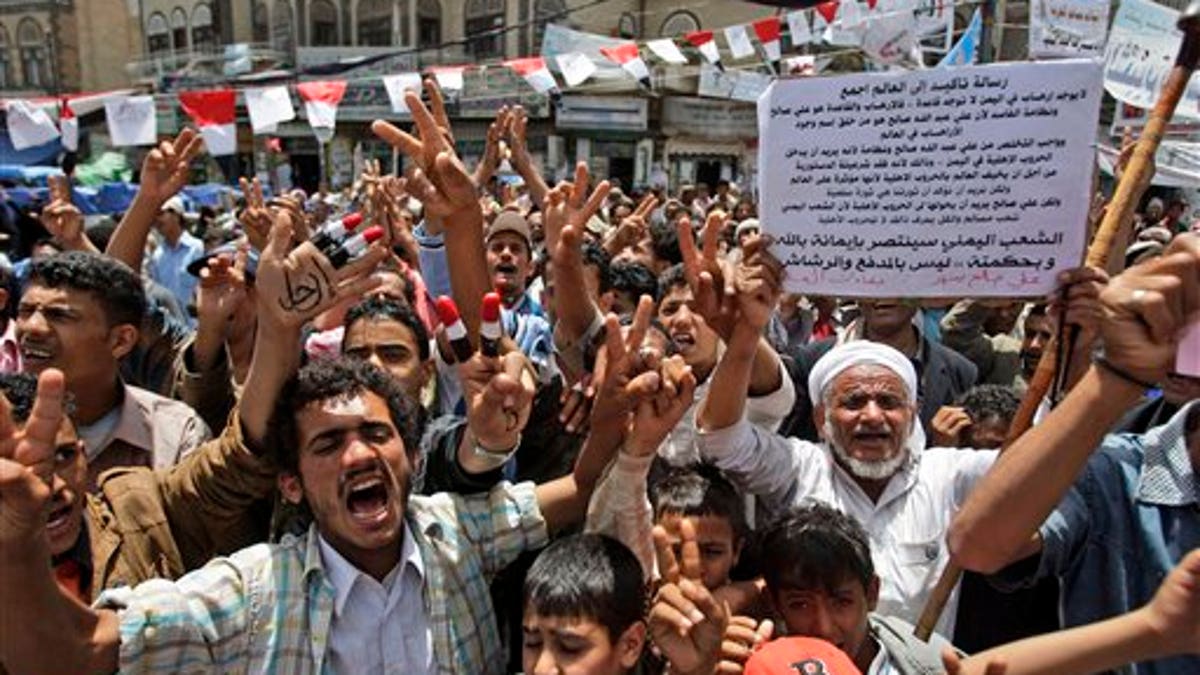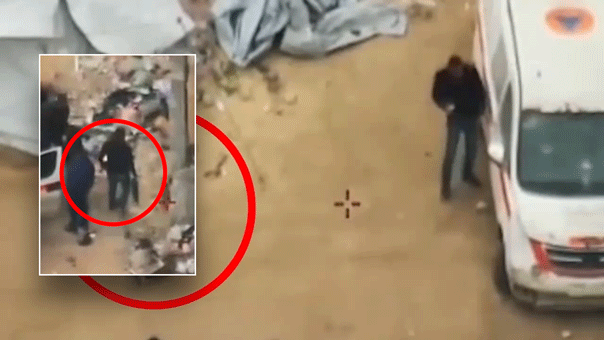
May 29: Anti-government protestors shout slogans during a demonstration demanding the resignation of Yemeni President Ali Abdullah Saleh in Sanaa, Yemen. (AP)
A Yemeni medical official says soldiers loyal to Yemen's president, Ali Abdullah Saleh, have stormed a protest camp in the southern city of Taiz and fired on the crowds indiscriminately, killing at least 20.
After the attack on the anti-government protesters, residents say Yemen's air force launched an offensive against Al Qaeda and Islamic militants who overran the city of Zinjibar. Residents also told Reuters that Zinjibar was being shelled with artillery.
Hospital sources told Reuters that at least 120 were wounded in the Taiz attack.
The crowds gathered to demand the release of a fellow protester who was arrested Saturday, Reuters reports.
Security forces first tried to clear the square in Taiz with water cannons, tear gas and sound bombs, sending thousands rushing for shelter.
Forces from the Republican Guard, which is commanded by one of Saleh's sons, then moved in before dawn with tanks and bulldozers, said Sadek al-Shugaa, head of a field hospital at the protest camp.
Republican Guard soldiers along with security forces and armed men in civilian clothes attacked the protesters. Some set fire to dozens of tents used by the protesters, and bulldozers ran over hundreds of other tents without checking whether any protesters were still inside, two witnesses said.
One of them, Mohammed al-Zarafi, said he saw tents being set on fire while injured protesters were still inside.
The other witness, protester Boushra al-Maqtali, called the attack "a real massacre."
"The square and the (field) hospital are in ruins," she said. "The tanks took the place of hundreds of tents that were set up there. The artillery units are occupying the whole space to make it impossible for the youth to return to the square," she said.
The violence took place in Freedom Square -- a popular gathering point for thousands of anti-government protesters that have been camping there since January to demand Saleh's overthrow, Reuters reports. As police set two tents in the square on fire, protesters responded by hurling molotov bombs and rocks at them.
Troops also attacked the Majeedi Hotel overlooking the square, where journalists were detained, al-Shugaa said. Then snipers took over the top of the building to shoot at protesters. Amateur video aired by Al-Jazeera TV showed masked men with rifles shooting from rooftops at the protesters in the street.
Al-Shaga said "most of the injuries are critical in the head, chest and neck."
He said several dozen of the injured were dragged away by security forces and vanished.
The city of Taiz has been a hotbed of anti-government protests since crowds began calling for Saleh's ouster in early February.
In Zinjibar, resident Ali Dahmas says he saw fighter jets firing at the southern outskirts of the town and heard loud explosions that sent up columns of smoke. He spoke to The Associated Press by phone on Monday.
Military units battled the militants in Zinjibar overnight and into the morning in an attempt to clear the fighters from the town, where they've blockaded themselves behind barricades and rocks.
Shelling killed at least four of the fighters, bringing the death toll there since Saturday to 34, according to an official at al-Razi hospital who spoke on condition of anonymity because he was not permitted to talk to journalists
In the capital city of Sanaa, residents told Reuters that seven explosions were heard Sunday night, although no immediate details were available on their source.
A Yemeni rights activist said Sunday that a brigade of the powerful Republican Guard run by the son of Saleh has defected to the opposition in a southern province.
It's the first reported defection among the elite troops, which have been the core of Saleh's hold on power despite three months of massive street protests and defections by some military and tribal allies.
Activist Abdul-Rahman Ahmed says a letter from Brig. Gen. Ibrahim al-Jayfi, commander of the Guard's Ninth Brigade was read to thousands of protesters in the provincial capital of Damar on Sunday.
Experts say the uprising's future will be determined by the number of tribes and security forces that turn against Saleh. Many already have, including the Hashid confederation, to which Saleh's tribe belongs. Some army units have also left Saleh to back the protesters, though they did not join the fight against his forces.
The Associated Press contributed to this report.








































